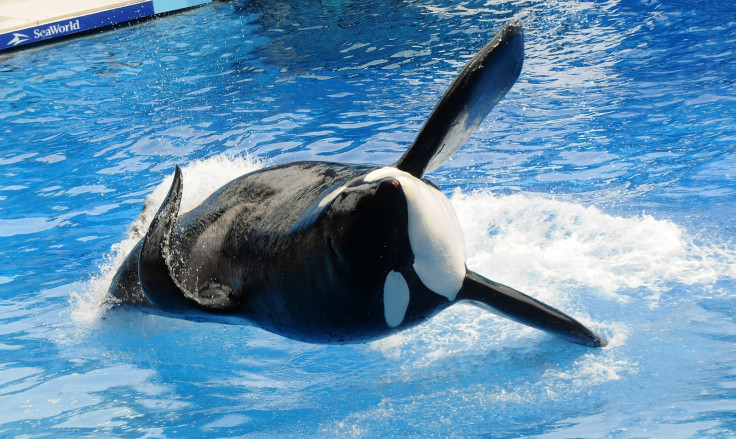It's too late for Tilikum, but the other orcas imprisoned at SeaWorld can still be freed
Why can't SeaWorld use VR technology instead of live orca, asks Peta's Mimi Bekhechi
Tilikum, the world's most famous "killer whale", is dead. He found the only way out of the miserable tank he was imprisoned in and is finally at peace after decades of suffering.
The orca, subject of the hit documentary Blackfish – the true-life horror film about SeaWorld – spent 34 years enslaved in marine amusement parks. From the day he was torn away from his ocean home as a baby, his life was reduced from expansive open waters full of adventure to endless circles in a chemically treated concrete bathtub containing 0.0001% of the quantity of water that he would have traversed in a single day in nature.
Orca, such as Tilikum, are deprived of hope and driven insane by their depleted lives, which consist of performing meaningless tricks in exchange for dead fish. His body bore this frustration, broken after years spent desperately gnawing at the bars that trapped him.
His back was covered in marks where his female fellow inmates asserted their dominance over him, continuously raking their teeth across his body, while he had nowhere to swim to and nowhere to hide. He could do little else than spend his days listlessly floating, alone and lonely.
His existence at SeaWorld stood in sharp contrast to the life he would have had in the wild. In their native habitats, orca live in large groups and have complex relationships, which include long-term bonds and cooperative networks. In some populations, they rarely leave their mother's pod, spending decades together. Wild orca pods have unique dialects that are considered a form of language unrivalled by any species other than humans. We know so much more about these animals than we did in 1983 when Tilikum was captured, and we now know, without a doubt, that captivity is torture for them.

As a result of Blackfish's success and campaigns by People for the Ethical Treatment of Animals (Peta) and other animal-protection groups, the tide has turned for SeaWorld. The company's profits are down, musicians scheduled to perform at its parks have jumped ship, and travel agencies including STA Travel have pulled it from their promotions.
Last year, SeaWorld announced it was ending its captive orca-breeding programme after relentless and constantly mounting public pressure. Although this decision did nothing for Tilikum (who was bred 21 times – and 11 of his offspring died before he did), it means that future generations of orca won't have to suffer as he did.
But it's not enough. The remaining orca currently held captive by SeaWorld can – and must – be transferred to sea pens that mimic their natural environments and maybe even be released back into their home waters, depending on their needs and abilities. Given that these animals can live up to 90 years in the wild (indeed, "Granny", who died in the wild last week, was estimated to be more than 100 years old!), it's possible that the families they were taken from years ago could be identified through vocal analysis so that they could be reintegrated back into their pods.
These broken souls would have a chance to come alive again, feel actual sea water on their skin instead of chlorine, swim with natural ocean currents, and possibly even communicate with the families they were stolen from so long ago.
If SeaWorld hopes to outlive its remaining orca, it has no choice but to reinvent itself – and it can do so with new technologies, such as 3-D mapping and virtual reality, that enthral, educate, and inspire without exploiting animals. The company already plans to make its new park – set to open in Abu Dhabi – orca-free and to use state-of-the-art ocean technology to create an awe-inspiring experience for its visitors. So there's no excuse not to do the same at parks across the world.
It's too late to save Tilikum, but SeaWorld still has an opportunity to give the other orca that it holds captive a chance of a better life, and, in the process, give itself a chance of a future, too.
Mimi Bekhechi is Peta UK's director of international programmes.
© Copyright IBTimes 2025. All rights reserved.






















